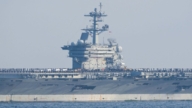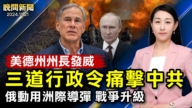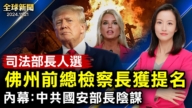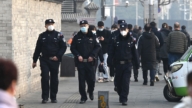【新唐人2012年10月27日訊】「英國倫敦經濟學院」教授文安立(Odd ArneWestad),10月18號在《彭博社》(Bloomberg)發表一篇探討中國和東盟(ASEAN)關係的評論,他提到,自鄧小平以來的30年,中國持續對東南亞國家所謂的「示好」。但是兩年前,中國和東盟的關係急轉直下。文安立認為,這是中國的 「天朝」心態作祟。中國學者指出,鄧小平過去所說的韜光養晦,其實是等待時機。中共作為一個獨裁政權,一旦國力強大,稱霸的心態就避免不了。
「英國倫敦經濟學院」教授文安立指出,直到兩年前,中國和東盟各國,即使是越南,都是水乳交融。事情的轉捩點發生在2010年,中國外交部長楊潔篪在河內舉行的「東盟區域論壇(ASEAN RegionalForum)」上忍不住滿腔怒火,向代表美國出席會議的國務卿希拉里.克林頓(HillaryClinton)大發雷霆。
導火線在於,與中國涉及「南海爭議」的越南、馬來西亞、菲律賓與汶萊等四國,聯合美國、歐盟與印尼,同意採取「多邊」協商機制,不像北京所想的所謂「一對一」個別協商方式,來解決爭議問題。
文安立認為,中國人心中存在著「我們是大國,而你們是小國」的不當想法。從歷史來看,中國自隋朝起,因國力強盛,建立以中國為宗主國,周邊國家為藩屬國的朝貢體系,當時中國是世界的政治、經濟和文化中心,被冠以「天朝」的美名。文安定認為,對東亞事務,中國(共)仍保持舊有的「天朝」想法,將自己視為區域中最獨特的,還將自己的觀點和宣稱視為區域之必要。
北京自由作家殷德義指出,中國人的自我心態一直以來很容易自我膨脹。中國和東盟這麼多的國家,一直以來和平相處。但是為甚麼最近幾年忽然頻頻跟周邊國家發生衝突呢?
北京自由作家 殷德義:「以前他把這些爭議擱置起來了。其實他擱置的目地只是等著有一天,等著自己有力量的時候,再去權衡再去博弈,現在他力量強大了。他就可以有資格去博弈了。因為他可以提供貸款,用金援外交各種各樣的方式,用經濟手段限制進出口,逼迫對方來就範。比如對日本。」
殷德義說,中共作為一個獨裁政權,尤其容易把「民族主義」情緒煽動起來。東南亞國家現在感覺到中共存在的威脅。
殷德義:「作為一個共產主義國家,這種獨裁體制下,不是一個民選的政府,這些人(中共當局)他就很容易去操縱國內的情緒,在這種情況下,他可以振臂一呼,應者千萬、上億,一切用這種限制新聞自由的情況下,下情不能上達的情況下,他很容易被自己的權力導致他產生幻覺。」
殷德義認為,周邊國家必然會與中共交惡。如果現在不交惡,將來會越來越嚴重。
殷德義:「發展越來越好的話,如果再有一個好的國際環境,中共就意識不到自身的一些短板。你像馬六甲海峽,中國80%的石油都要通過馬六甲海峽進口。但是馬六甲海峽路經的所有這些國家都有美軍基地。如果他與這些國家交惡繼續嚴重的話,中國的咽喉可以說會被掐住的。」
文安定建議,中國應以更謙沖的態度處理「南海爭議」,除了與各國務實的協商海域的劃分,更應建立具體的信任機制和預防衝突的措施,減少在這個地區的軍事行為。如此,爭議漸漸消弭,中國與東協才能繼續共榮發展。
採訪編輯/秦雪 後製/君卓
Expert Attributes Tightening of China-ASEAN Relations to
CCP’s Extravagant Self-Consciousness
Odd Arne Westad, professor of London School of Economics
and Political Science, published an article about China-ASEAN relations on Bloomberg News on October 18th.
The article wrote that, although China had kept a friendly
attitude toward Southeast Asian countries for 30 years since the Deng Xiaoping era,
relations between China and ASEAN suddenly worsened
two years ago.
Odd Arne Westad attributed this change to
the CCP’s “consciousness of its growing power”.
Some Chinese scholars remarked that, the CCP kept a low profile
in the past in order to wait for better opportunities.
As a dictatorship, the CCP cannot help seeking hegemony
once its national power grows larger.
Professor of London School of Economics and Political Science
Odd Arne Westad recently made comments that,
until two years ago China had kept up good relations with
Southeast Asian countries, including Vietnam.
However, the situation changed abruptly in 2010 at the
ASEAN Regional Forum,
where CCP’s Foreign Minister Yang Jiechi lost his temper
and flared up against U.S. Secretary of State Hillary Clinton.
The cause of Yang’s anger was that, Vietnam, Malaysia,
Philippines and Brunei which all have territorial disputes with China,
had worked out a multilateral negotiation mechanism under
the support of the United States, the European Union and Indonesia.
This deviated from the CCP’s preferred way of solving
dispute issues based on one-to-one negotiations.
Odd Arne Westad remarked that, the Chinese had an
improper view that saw the situation in terms of: “We are a large nation and you are only small ones”.
In history, China became the central state of the region
with dominating power and received tributes from affiliated countries since the Sui Dynasty.
At that time, China was the political, economical and cultural
center of the world, and was hence called the “Celestial Empire”.
Odd Arne Westad believes that the CCP still keeps a
self-awareness as the “Celestial Empire” in dealing with East Asian affairs.
Therefore it regards itself as the most important nation of
the region with the authority to spread its opinions around the neighborhood.
Beijing freelancer Yin Deyi remarked that, the Chinese have
a traditional trend of easily inflating their egos.
However, as China and Southeast Asian countries
have been at peace for a long time,
why did the outbreak of clashes suddenly become
more frequent in recent years?
(Yin Deyi, Beijing freelancer):”Previously all the disputed
issues were simply laid aside because the CCP wanted to reconsider the problems when its power became stronger.
Now the CCP’s power has grown a lot
so it can have more options to win the game.
For example, it can provide loans, play checkbook diplomacy,
or set restrictions for import and export to strike at its opponents.
Those measures have been taken against Japan.”
Yin Deyi said that the CCP regime could easily
arouse nationalistic emotions in China;
and that Southeast Asian countries had recently
felt a real threat from the CCP regime.
(Yin Deyi):”As a Communist nation China’s political regime
is autocratic rather than democratic.
So it is much easier for those people (CCP leaders)
to control the sentiments of it’s citizens.
In such an environment, millions, or even billions of people
follow whatever the leaders say.
With numerous restrictions against freedom of information,
It is difficult for the leaders to know conditions at lower levels of society.
Therefore they can easily have illusions with
the power they have at hand.”
Yin Deyi believes that, it is inevitable that neighboring
countries will come into conflict with the CCP regime.
The later those clashes come, the more serious
the conflict will be.
(Yin Deyi):”With the relatively smooth development
in economics,
the CCP won’t realize its problems if it further enjoys
a friendly international environment.
For example, 80% of China’s oil import has to pass
through the Strait of Malacca.
However, the United States has military bases
in all the countries near the strait.
If relations between China and those countries
continue to worsen,
the CCP will find its vital passage of transport
under the control of others.”
Odd Arne Westad has suggested that China should handle
disputes in the South China Sea in a less aggressive way.
It should negotiate with other countries to deal with concrete
matters such as sea area division.
In addition, trust mechanisms and preventative measures
against conflicts should be established to reduce the possibility of military action in the region.
If this becomes true, clashes will gradually disappear and
China can prosper together with Southeast Asian countries.





























